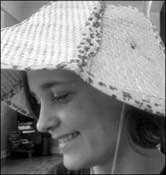My great-grandfather, DeeDee, was half Native American, according to my mother's family folklore, I can believe that. He and my great grandmother, Mamie, played a major role in my upbringing.
DeeDee didn't sermonize, and he didn't dictate. He simply stated his observations and taught me through his actions. He would point out a trash pile someone left in the woods and say something like: "You see that, Casey? That's polluting the land. When you do something like that, you hurt the land you live on. If you hurt your land, you hurt yourself." So I learned not to litter.
"Casey, you can't ride that horse anymore," he'd say. "See how she limps? She'll be crippled if you ride her, and we might even have to put her down if she's suffering and can't be helped." So I learned that doing no harm was often the best first course of action.
"Casey, I think you played hooky today when you coulda gone to school," he said. "You and I both know you told a story about being sick so you wouldn't have to go to school." I learned to use my conscience as a moral compass.
Most of the time, he taught me about life without saying a word. When he was still healthy enough, we'd walk together through the pasture that connected my parents' house to his, and he would point out different trees and name them for me. He taught me not just to look, but to see what was in front of me.
I think the most important lesson DeeDee taught me was this: You should never take more than you can give back. It is as relevant now as it was then, because from what I can see, we have become a taking kind of society. We have no problem shopping in a store that outsources its manufacturing labor to developing countries with lax or non-existent labor laws, just so we can buy stuff at lower prices. We seem to have no problem turning a blind eye to the working poor who may be going hungry themselves just so we can eat a cheaper hamburger.
Do we ever look at the plastic-encased chicken breasts at the grocery store and wonder about the life that chicken had? Did it live out its days in a cramped cage where it was unable to turn around before it finally met its demise and ended up in our grocery buggy?
I suppose I have a bleeding heart.
Does it really affect me directly if an undernourished 12-year-old in an overseas sweatshop sat with shoulders hunched and neck bent for hours constructing my jeans and hundreds more? Does it affect me that he maybe had to not only go to bed not only exhausted, but hungry as well? So what. As long as the jeans were on sale, you may think, it shouldn't bother me.
"I'm not an activist," you may be thinking. "I can't change the world. It's not my problem, and it's not my fault. And besides, what can I do about it?
I think if DeeDee was still here, he'd say that particular line of reasoning is what's gotten our nation into the fix it's in today. He would probably say that contributing, even indirectly, to the suffering of others is an act of spiritual indecency that will not go unaccounted for. DeeDee didn't attend church much, but he was a man who believed in a day of judgment.
For years, we Americans have enjoyed having the upper hand. We've helped install dictators in other countries, allowed Big Business to do as it pleased with our natural and human resources—as long as it gave us greater purchasing power. We have spent for the sake of instant gratification and have fallen asleep at the wheel. We have allowed our politicians to take liberties with our constitutional rights in the name of national security. We were too busy watching reality TV to take notice of what was happening to us.
But to turn a blind eye to how an end is achieved is to make a deal with the devil. Apparently, our time is up, and he is coming to collect. And here we stand: wounded, uncertain, bemused, with empty pockets and the realization that we helped make this mess.
Is it too late to begin again?
"Casey, the question is, what can you do about it?" DeeDee would probably ask me.
I think this could be a good lesson for everybody. No use crying over spilt milk. You just clean it up.
Casey Purvis is a Fondrenite who loves planting flowers and watching the birds in her backyard. She is a sucker for a suspenseful movie or thought-provoking documentary. She is owned by Phoebe, a 9-year-old Lhasa apso. She works as a nurse in a local hospital.



Comments
Use the comment form below to begin a discussion about this content.
comments powered by Disqus